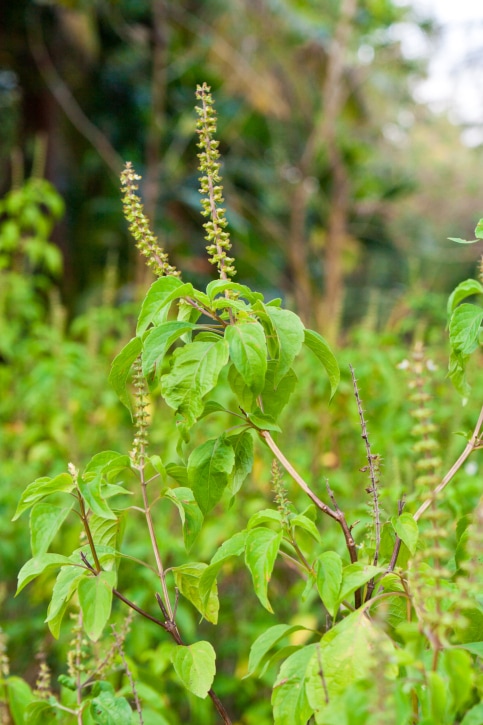Tulsi
 Hindi Name: Holy Basil
Hindi Name: Holy BasilThe Tulsi or The holy basil is mostly used as a herbal remedy for a lot of common ailments because of its essential oils. Tulsi is a green leaf herb with excellent aromatic properties.
In South Asia it is commonly used in Ayurveda. In India, it is considered holy and is therefore rarely added to any dish. But it is consumed in the form of herbal tea. On the other hand, Tulsi is used in Thai cuisines especially in a stir-fry dish made with meats or seafood.
Nutritional Value
1. It has healing power as the leaves act as a nerve tonic and also sharpen memory.
2. Tulsi is often made into a poultice and applied to get rid of fever and cold. Tulsi is an important constituent of many Ayurvedic cough syrups and expectorants. Chewing tulsi leaves relieves cold and flu.
3. Warm Tulsi water is good for gargling in case of sore throat.
4. Consuming Tulsi with honey and ginger has shown to reduce the risk of respiratory problems.
5. It also has strengthening effect on the kidney and is beneficial against cardiac diseases. It also reduces the level of blood cholesterol.
6. Tulsi is also considered to be an anti-stress agent.
7. Tulsi has been traditionally used to cure sore throats, respiratory disorders, kidney stones, insect bites, mouth infections, stress and heart disorders.
Usage
It is used as a flavoring in a range of dishes spanning continents, from vegetables, sauces to pizzas and cheeses. Thai cuisine also features a lot of the Tulsi in its dishes. It can be included in salads, desserts, stir fries, tea and is used to made pesto.
Did you know?
In Indian mythology, it is the equivalent of Lakshmi, and literally translated means 'the incomparable one'.
Tip: Though used both fresh and dried, the fresh variety packs a punch of flavor and the plant is very easy to grow.
Caution: Tulsi leaves contain mercury, and hence should not be chewed as it can damage the teeth.
No comments:
Post a Comment